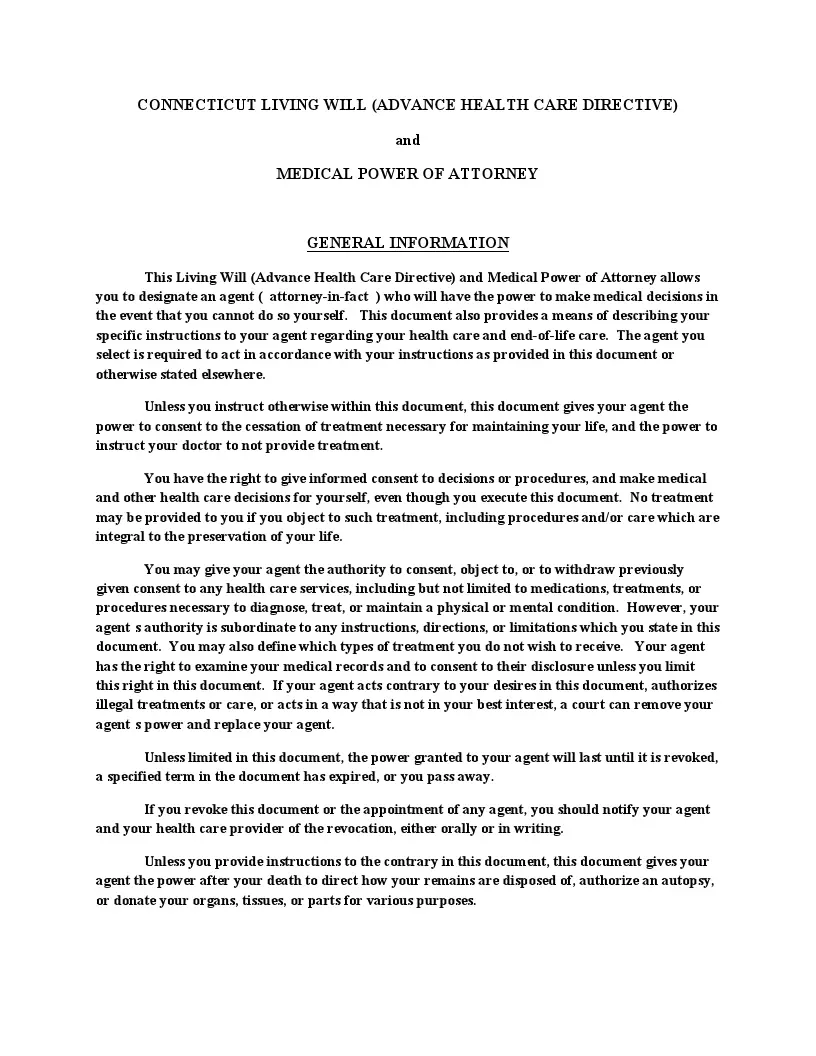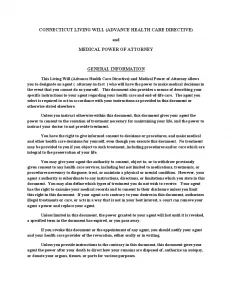Free Connecticut Living Will Form
In Connecticut, a living will, also known as an “Advance Healthcare Directive,” allows you to state your wishes regarding medical treatment in situations where you cannot communicate due to illness or incapacity. The Connecticut living will must be signed by you and witnessed by two other individuals who are not beneficiaries of your estate.
Alongside a living will template, you can appoint a health care representative in Connecticut. This person will be able to make medical decisions based on your wishes. Once signed and properly witnessed, the living will remains valid until you revoke it. Changes or revocation can be made anytime as long as you are mentally competent.
It’s advisable to ensure that your health care provider, health care representative, and close family members have copies of your living will or know where to find it in an emergency.

Build Your Document
Answer a few simple questions to make your document in minutes
Save and Print
Save progress and finish on any device, download and print anytime
Sign and Use
Your valid, lawyer-approved document is ready
Signing Requirements and Laws
The legal requirements for executing a living will are outlined in the Connecticut General Statutes under Section 19a-575. The Connecticut living will must be signed by the declarant (the person making the living will) and witnessed by two other individuals. These witnesses must be adults and should not be the person who is appointed as the health care representative, nor should they be responsible for the costs of the declarant’s medical care. Witnesses cannot be:
- Related to the declarant by blood or marriage;
- Beneficiaries of the declarant’s estate;
- Financially responsible for the declarant’s medical care;
- Directly involved in the provision of health care to the declarant at the time the directive is executed.
The Connecticut living will should clearly state the declarant’s wishes regarding the withholding or withdrawing life-sustaining treatment if the declarant is in a terminal condition, permanently unconscious, or under similar conditions as specified in the document. The declarant must be of sound mind and at least 18 years old to execute a living will.
Section 19a-575a deals with the revocation process. In Connecticut, a living will may be revoked at any time and in any manner by the declarant without regard to mental or physical condition. A revocation is effective upon communication with the attending physician or other health care provider.
Connecticut Living Will Form Details
| Document Name | Connecticut Living Will Form |
| State Form Name | Connecticut Advance Health Care Directive |
| Signing Requirements | Two Witnesses |
| Validity Requirements | Section 19a-575a |
| Powers Limitation | Section 19a-575 |
| State Laws: Connecticut General Statutes, Sections 19a-575 to 19a-580a | |

Steps to Fill Out the Form
To fill out the Connecticut living will form, it’s essential to carefully detail your health care preferences and appoint someone trustworthy to make decisions on your behalf. Here’s how to complete the form.
1. Appointment of a Health Care Representative
Decide whether to appoint a health care representative. If you choose not to appoint one, initial the designated area to indicate this choice and move to the next section. If you decide to appoint a representative, fill in their name and address in the provided spaces. This person will have the authority to make all necessary healthcare decisions on your behalf if you are unable to do so.
2. Living Will and Health Care Instructions
You have the option to provide specific health care instructions within this section. If you prefer not to provide any instructions, initial to indicate your decision and skip to the next section. If you choose to give instructions, write a statement specifying your desires regarding life-prolonging treatments when you are unable to make decisions. You can specify which life support systems you do not want by initialing the appropriate boxes.
3. Document of Anatomical Gift
You can choose to make an anatomical gift by initialing your choice to donate or not to donate your organs upon death. If you decide to donate, specify whether your organs should be used for any medically acceptable purpose or specific ones. You can also list specific organs or parts you wish to donate.
4. Designation of a Conservator for Future Incapacity
In this section, you can choose not to designate a conservator, or you can specify a person who will manage your affairs if you become incapacitated. If the primary conservator is unable or unwilling to serve, you can designate an alternative conservator.
5. Witnesses’ Statements
After completing the form, it must be signed by two witnesses. The witnesses must be adults of sound mind and not be the individuals appointed as your health care representative or conservator. They need to sign and print their names, along with their addresses, to validate the form.

Below are various other Connecticut templates completed by our users. Try our simple builder to customize these forms to your preferences.